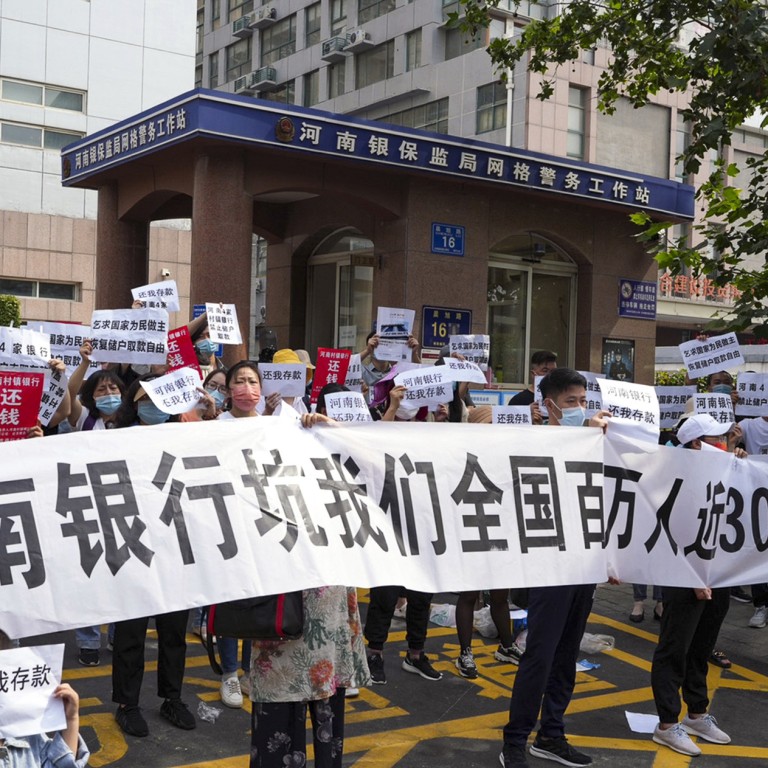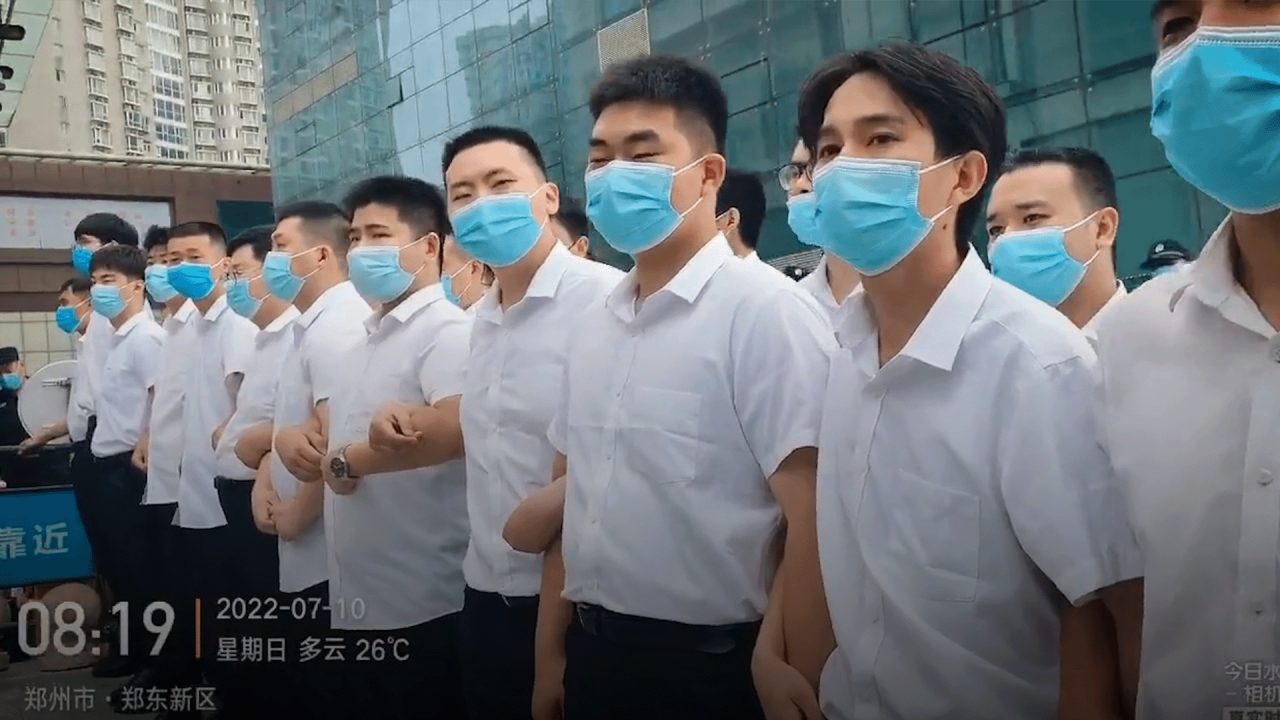
Analysis | How China’s Henan bank scandal threatens a ‘crisis of confidence’ in nation’s financial system
- Central bank vows to strengthen efforts to crack down on illegal financial activities during a period that could see ‘flare-ups of financial risks’
- Small banks elsewhere in China, such as the rust-belt region of Liaoning, are also said to be susceptible to economic upheaval ‘if risks cannot be contained’
The banking scandal in China’s central Henan province could be merely the tip of the iceberg in terms of systemic risks, and its impact threatens to snowball if regulators fail to bring it under control while the nation is struggling to boost its economy, according to analysts.
Meanwhile, a central bank official vowed on Wednesday to beef up efforts in cracking down on illegal financial activities while also protecting consumer interests.
The protests subsequently escalated to a violent clash on Sunday. Protesters were surrounded by local police and were recorded being beaten by unidentified men in white shirts.
China’s banking-crisis victims promised money, but ‘it doesn’t solve problem’
China’s small banks are often closely connected to local governments through companies they control, and these banks have exposure to the increasingly volatile real estate sector, making them more vulnerable to economic downturns than China’s largest banks.
Xia Le, chief economist for Asia at BBVA Research, said local governments will need to intervene to prevent large-scale defaults at the small banks.
And Xia noted that it will require a coordinated response from the China Banking and Insurance Regulatory Commission (CIBRC) and the People’s Bank of China (PBOC) to manage and mitigate the fallout in the broader financial system.
“We are now in a period in which we’ll see flare-ups of financial risks,” Xia said. “It will become more severe if regulators do nothing. It is also their responsibility to maintain stability.”
The head of the PBOC’s stability bureau, Sun Tianqi, commented on the scandal at a press conference on Wednesday afternoon.
“The central bank has proactively cooperated with local governments and regulators to address the issue, and has guided local branches to maintain regional financial stability, monitor the liquidity risks and take contingency support,” Sun said.
“Overall speaking, the financial risks are largely under control, and 99 per cent of our banking assets are within the safe range.
“In the face of complicated financial and economic situations at home and abroad, financial regulators must remain on high alert to all risks and further make precautions and guard against systematic risks.”
As for all kinds of illegal financial activities that are abhorred by the public, we will [take] quick and firm actions to address the risks
Citing data from the central bank’s fourth-quarter rating report for last year, Sun said that 24 of the 4,398 banks that took part in the survey were rated as safe by the PBOC, and that those 24 banks represented 70 per cent of all assets of the banks.
Meanwhile, 316 were rated as high risk, including the rural banks in Henan, and they represented just 1 per cent of all the assets of the banks.
“As for all kinds of illegal financial activities that are abhorred by the public, we will stick to the approach of early discovery, precise identification, and quick and firm actions to address the risks,” Sun said.
According to CIBRC data, small-bank assets account for 29 per cent of overall banking assets in the country.
Hunt is on for China’s cash crisis culprit, named by police in bank scandal
The small banks’ share is relatively little compared with that of the large state-owned and joint-stock banks, but any collapse could still have an adverse impact on confidence in the country’s government-dominated financial system.
In the case of Henan, some of the rural banks in question are majority owned by Xuchang Rural Commercial Bank, which is controlled by Xuchang City Investment Group, a local government financial vehicle (LGFV) of the Xuchang city government.
Xuchang City Investment Group said in a statement in May that rural banks in which it has shares operate independently, and that it does not have control over their operations.
The LGFV also denied any connections with Henan Xincaifu Group, a company that police say is at the centre of the current scandal, having allegedly been used by a criminal suspect to effectively control several rural banks.
China finds dozens of local governments misusing funds in debt crackdown
“As it is the focus of the incident, Xuchang Rural Commercial Bank has suffered certain damage to its reputation and future operations,” YY Rating said in a report last month.
“As the parent company of Xuchang Rural Commercial Bank, it is also difficult for Xuchang City Investment to be immune from this turmoil.”
YY Rating’s report highlighted that many shareholders of Xuchang Rural Commercial Bank have poor credit track records and comprise mostly small to medium-sized enterprises operating in low-growth industries such as property, food processing and textiles.
Some of these shareholders have also pledged their shares to other companies that have not been disclosed publicly as shareholders of the rural bank.
The report concluded that the transparency of Xuchang Rural Commercial Bank’s shareholding structure is relatively opaque. The bank has also been reprimanded by regulators on a number of occasions for violations including illegal operations, false disclosures and illegal lending.
What needs to be addressed urgently is a crisis of confidence in the banking system
But overall, the rural banks in question offer limited financial support for the local economy, YY Rating said, adding that the direct financial impact on the LGFV – Xuchang City Investment Group – is likely to be marginal if the banks are to be consolidated.
“What needs to be addressed urgently is a crisis of confidence in the banking system,” YY Rating said.
Last year, the Henan government borrowed 25.7 billion yuan (US$3.82 billion) via a special-purpose bond to replenish 40 of its small banks, including 1.85 billion yuan for Xuchang Rural Commercial Bank.
Other local governments, such as in the northeastern province of Liaoning, have also stepped up supervision of the small-bank sector. The provincial government has issued three rounds of special-purpose bonds totalling 33.1 billion yuan since last year to recapitalise local banks.
If the risks cannot be contained, what happened in Henan will also likely happen in Liaoning
“If the risks cannot be contained, what happened in Henan will also likely happen in Liaoning,” said a Liaoning-based auditor on condition of anonymity.
Many of these small lenders have freely issued loans to major local companies with loose or no credit checks, creating room for corruption, while attaching their liquidity to the financial health of certain firms, according to some experts.
Since last year, disciplinary action and criminal coercive measures have been taken against 63 executives of small to medium-sized banks in Liaoning, according to a CBIRC briefing in May. The province has 75 such banks, including city-based commercial and rural banks.
A typical case has been China Zhongwang Holdings, a major maker of aluminium products in the country, headquartered in the city of Liaoyang in central Liaoning province. The Hong Kong-listed company once controlled several regional banks through capital operations, including Bank of Liaoyang and Liaoyang Rural Commercial Bank.
‘I have nothing but loans’: China’s economic rut shakes middle-class dreams
Bank of Liaoyang has since been merged with Yingkou Coastal Bank – another city commercial bank that had been affected by rumours of a cash crisis. The two formed the Bank of Liaoshen in June last year.
According to a plan by the Liaoning government in January last year, the ultimate goal was to consolidate 12 of the 15 city commercial banks in the province into the Bank of Liaoshen, which is a government-owned lender.
Liaoyang Rural Commercial Bank, together with Liaoning Taizihe Rural Bank, were merged into Shenyang Rural Commercial Bank, according to the Liaoning office of the CBIRC earlier this month.
Liaoyang Rural Commercial Bank’s former head, Jiang Dongmei, was accused of corruption, arrested overseas, and repatriated in 2021.
For now, an important task for local governments is to maintain economic growth amid rising financial problems.
Local governments are likely to step up efforts [to manage economic growth]. This year, they don’t want to see a deteriorating economy … everyone is expected to work hard at it
But the emphasis on meeting Beijing’s growth target also sends a strong message to local governments that they need to make economic growth a priority, according to Xia with BBVA Research.
“There are politics involved – this is the year of China’s 20th Party Congress,” Xia said, referring to the upcoming autumn meeting that is likely to see President Xi Jinping secure a historic third term.
“Local governments are likely to step up efforts [to manage economic growth]. This year, they don’t want to see a deteriorating economy … everyone is expected to work hard at it.”
Additional reporting by Frank Tang



